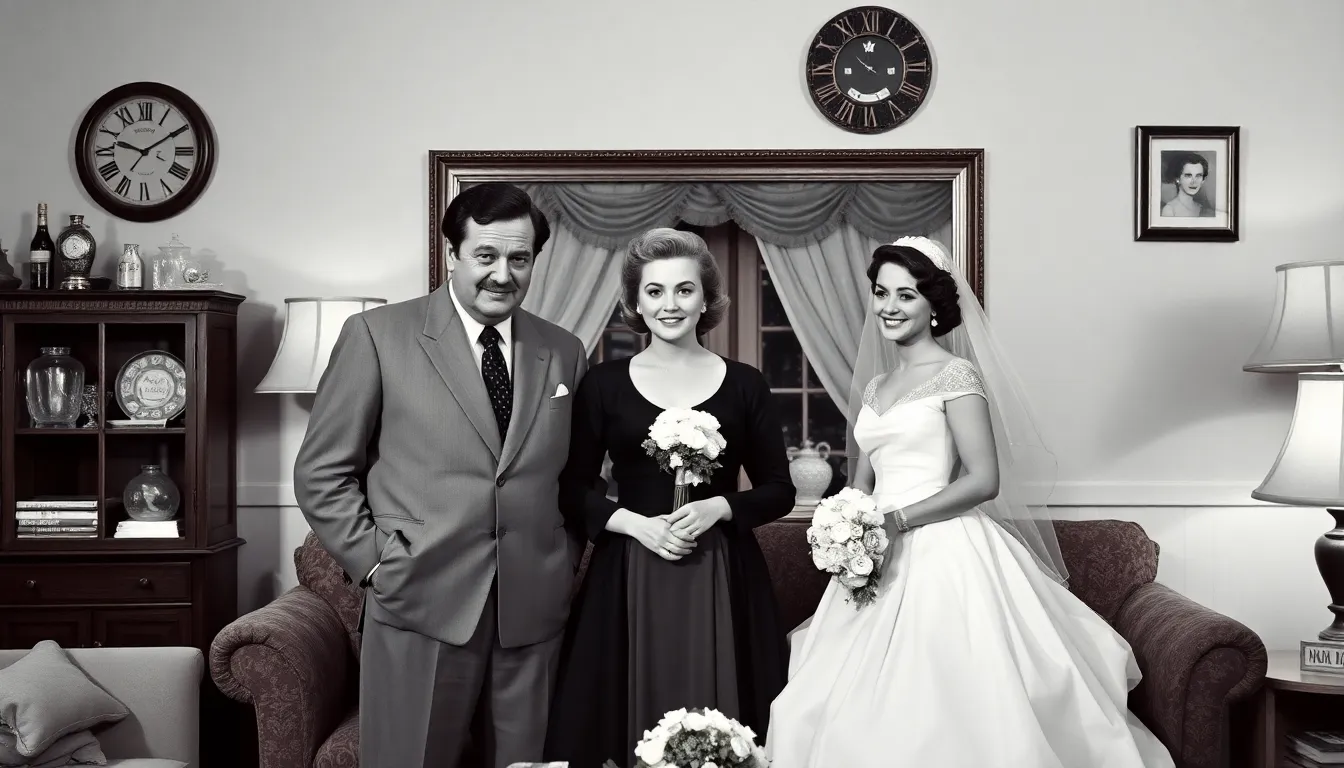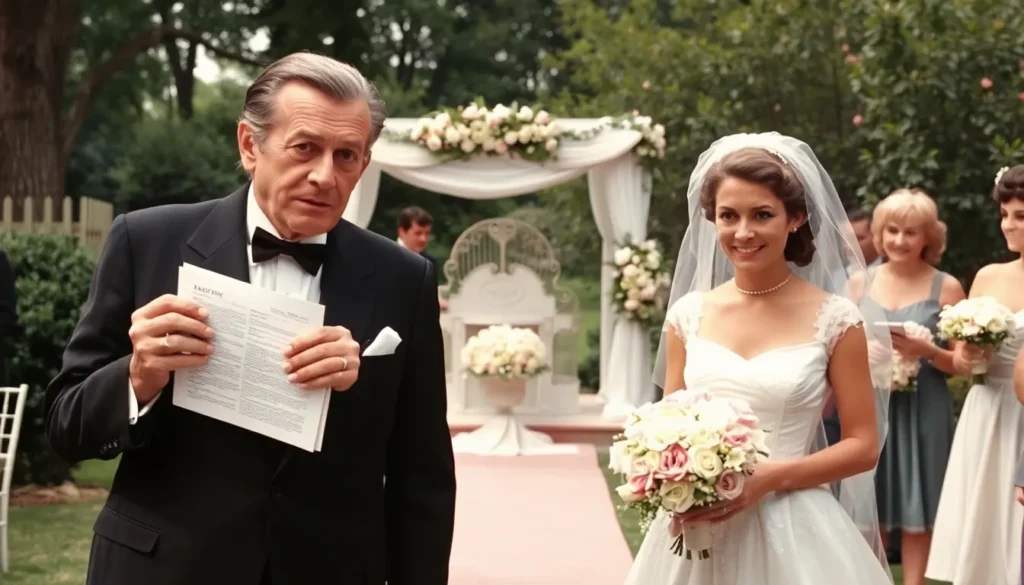In the world of classic cinema, few films capture the essence of love and family quite like Father of the Bride (1950). This delightful comedy not only showcases the whirlwind of wedding preparations but also highlights the endearing struggles of a father coming to terms with his daughter’s big day. With a charming cast that brings humor and heart to the screen, it’s no wonder this film remains a beloved favorite.
Starring the legendary Spencer Tracy as the hapless father and Elizabeth Taylor as his radiant daughter, the film delivers a perfect blend of laughter and sentiment. The dynamic between the characters creates a relatable portrayal of parental love, making it a timeless watch for anyone who’s ever experienced the chaos of planning a wedding. Dive into the world of Father of the Bride and discover the unforgettable performances that have left audiences chuckling for decades.
Table of Contents
ToggleOverview of Father of the Bride (1950)
“Father of the Bride” (1950) is a heartwarming comedy-drama centered around a father navigating the challenges of his daughter’s upcoming wedding. Spencer Tracy stars as the frazzled father, George B. McKenna, whose humorous yet poignant reactions to wedding planning capture the essence of parental love and anxiety. Elizabeth Taylor plays his daughter, Kay, bringing charm and youthful exuberance to the film.
Themes of love and family resonate throughout the story, emphasizing the emotional rollercoaster experienced by the groom. The film cleverly juxtaposes joyous moments with moments of stress, showcasing the universal struggles of parents facing significant life events. The characters elicit laughter while also provoking empathy, reflecting real-life dynamics between parents and children.
Supporting cast members enhance the film’s appeal. Joan Bennett plays the mother, who balances George’s apprehensions with warmth and understanding. The character of Buckley Dunstan, portrayed by Don Taylor, further adds depth, representing the future son-in-law’s perspective and excitement.
Released in 1950, the movie’s timeless qualities ensure continued relevance. Its ability to blend humor with heartfelt moments speaks to audiences across generations. “Father of the Bride” remains an iconic reflection of family relationships, capturing the essence of a father’s love amid the chaos of wedding planning.
Viewer responses emphasize the film’s charm and relatable experiences, cementing its status as a beloved classic. The engaging narrative, coupled with strong performances, has secured a lasting place in cinematic history.
Main Cast Members

The cast of “Father of the Bride” (1950) brings to life the heartfelt dynamics of a wedding. Each actor contributes uniquely to the film’s charm and humor.
Spencer Tracy as Stanley Banks
Spencer Tracy portrays Stanley Banks, a father overwhelmed by the chaos of wedding preparations. His comic timing and relatable exasperation resonate with viewers. Tracy’s performance captures the essence of parental anxiety mixed with love. Stanley navigates the pressures of budgeting and planning, showcasing a father’s emotional journey. The role highlights Tracy’s ability to blend humor with heartfelt moments, making Stanley a memorable character.
Joan Bennett as Elizabeth Banks
Joan Bennett plays Elizabeth Banks, Stanley’s supportive wife. Her character balances practicality with warmth, offering a steady presence amid wedding chaos. Elizabeth often provides reassurance to Stanley, grounding him during stressful moments. Bennett’s charm adds depth to the film, showcasing a loving partnership. The interactions between Elizabeth and Stanley reveal a nuanced depiction of marriage and teamwork in family matters.
Elizabeth Taylor as Annie Banks
Elizabeth Taylor embodies Annie Banks, the radiant bride at the center of the story. Taylor’s youthful exuberance captures the excitement of love and wedding planning. Her character’s journey reflects the mix of joy and anxiety associated with such a significant life event. Annie’s dreams and aspirations shine throughout the film, showcasing Taylor’s acting range and charm. The bond between Annie and her father carries emotional weight, making their moments together truly poignant.
Supporting Cast
The supporting cast in “Father of the Bride” adds depth and humor to the narrative. Their performances enhance the film’s exploration of love and family dynamics.
Leo G. Carroll as Rev. William H. Dodd
Leo G. Carroll portrays Rev. William H. Dodd, the family’s pastor. His character embodies a sense of calm as he navigates the wedding’s complexities. Rev. Dodd’s guidance brings a humorous touch during serious moments. Carroll’s performance offers a blend of wisdom and joviality, lightening the mood for the family. His interactions with the Banks family showcase the balance between tradition and modernity during their wedding preparations.
Billie Burke as Katherine “Kay” Banks
Billie Burke plays Katherine “Kay” Banks, the grandmother with a whimsical spirit. Her character enriches the film with charming insights and comic relief. Kay’s perspective on love and marriage resonates with both younger and older generations. Burke’s portrayal brings warmth, adding layers to family dynamics. Her role highlights the importance of nostalgia while also embracing the present-day chaos surrounding wedding plans.
Impact on Cinema
“Father of the Bride” (1950) significantly influenced the romantic comedy genre. Its blend of humor and heartfelt emotion set a template that resonated with audiences. This film established Spencer Tracy as a leading man in lighthearted narratives, showcasing his ability to portray relatable characters. Elizabeth Taylor’s performance as the bride brought a youthful spark, showcasing the nuances of familial love and wedding tension.
Comical moments in the film highlighted the stress parents experience during wedding planning. Stanley Banks’ comedic exasperation became emblematic of the overly involved parent archetype. Other films followed suit, often portraying fathers struggling with similar dynamics.
The narrative’s balance of tradition and modernity resonated with viewers. This exploration of family relationships remained relevant, influencing numerous films set in family environments. The chemistry between the leads set a standard for father-daughter relationships in cinema, seen in later stories about weddings and family gatherings.
Critical responses praised the film for its relatable themes. Viewers continued to reconnect with the characters during various life stages. Many filmmakers cited “Father of the Bride” as a reference point for crafting authentic parental roles, emphasizing the importance of character authenticity.
Overall, this film paved the way for future romantic comedies. Its reception marked a shift in how weddings were portrayed, blending humor with emotional depth. By capturing the essence of family dynamics, “Father of the Bride” remains a vital piece of cinematic history, continuing to inspire creators and entertain audiences through generations.
“Father of the Bride” remains a timeless classic that captures the essence of family and love through the lens of wedding preparations. The film’s blend of humor and heartfelt moments resonates with audiences even decades after its release. Spencer Tracy’s portrayal of the overwhelmed father and Elizabeth Taylor’s vibrant performance as the bride create a dynamic that speaks to the universal experiences of parents and children.
The supporting cast enriches the narrative, adding layers of warmth and nostalgia. Its influence on the romantic comedy genre is undeniable, setting a standard for future films that explore family dynamics. As viewers continue to relate to its themes, “Father of the Bride” solidifies its place in cinematic history, reminding us of the beautiful chaos that comes with love and family celebrations.





